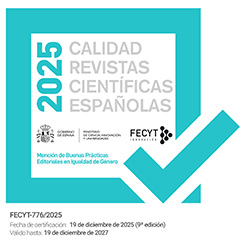A Sociological Interpretation of Dystopia in Neal Shusterman's "Unwind" Series
DOI:
https://doi.org/10.17561/grove.v31.8581Keywords:
sociological imagination, structuration theory, dystopian literature, social production, social structure, social positioningAbstract
Este artículo profundiza en el análisis sociológico de la serie Unwind de Neal Shusterman, explorando los temas de producción y reproducción social, estructura y estructuración social, y posicionamiento social dentro del mundo distópico representado en los libros. Ofrece una inmersión profunda en el rumbo del concepto de distopía y la literatura distópica desde un punto de vista sociológico. Utilizando la teoría de la estructuración de Anthony Giddens, este estudio investiga cómo los personajes navegan en su sociedad, la interacción entre los individuos y las estructuras sociales, y el impacto de la religión en sus creencias y acciones. También examina el papel del posicionamiento social y cómo la percepción que tiene la sociedad de los acontecimientos da forma a sus interacciones y su destino. Este artículo sostiene que el análisis sociológico revela las relaciones intrincadas entre los personajes y su entorno, destacando las consecuencias de una sociedad donde los niños están sometidos al desenvolvimiento y al espíritu resiliente de quienes resisten.
Downloads
References
Baccolini, Raffaella, and Tom Moylan. Dark Horizons: Science Fiction and the Dystopian Imagination. Routledge, 2003.
Bauman, Zygmunt. Retrotopia. Polity, 2017.
Bourdieu, Pierre. Outline of a Theory of Practice. Translated by Richard Nice, Cambridge University Press, 1977.
Brewer, John D. "Imagining the Sociological Imagination: The Biographical Context of a Sociological Classic." The British Journal of Sociology, vol. 55, no. 3, 2004, pp. 317–333. https://doi.org/10.1111/j.1468-4446.2004.00022.x. Accessed 13 Jan. 2023.
Budakov, V. M. “Dystopia: An Earlier Eighteenth-Century Use.” Notes and Queries, vol. 57, no. 1, 2010, pp. 86–88. https://doi.org/10.1093/notesj/gjp235. Accessed 21 Mar. 2023.
Burgos Mascarell, Andrea, and Miguel Martínez López. El Ocaso de 'Koinonia': La Distopía en la Literatura Norteamericana. Universitat de València, 2024.
Cohn, Norman. Cosmos, Chaos, and the World to Come: The Ancient Roots of Apocalyptic Faith. Yale University Press, 2001.
Collins, Suzanne. The Hunger Games. Scholastic Press, 2008.
Dashner, James. The Maze Runner. Delacorte Press, 2009.
Durkheim, Emile. The Division of Labor in Society. Free Press, 1997.
Foucault, Michel. Discipline and Punish: The Birth of the Prison. Vintage Books, 1995.
Giddens, Anthony. The Constitution of Society: Outline of the Theory of Structuration. Polity Press, 1984.
Lu, Marie. Legend. G.P. Putnam’s Sons, 2011.
Marcuse, Herbert. Five Lectures: Psychoanalysis, Politics, and Utopia. Penguin, 1970.
Mill, John Stuart. Collected Works of John Stuart Mill. Edited by John M. Robson et al., Routledge & Kegan Paul, 1965–1991.
Mills, C. Wright. The Sociological Imagination. Oxford University Press, 1959.
Negley, Glenn, and J. Max Patrick. The Quest for Utopia. Henry Schuman, 1952.
Orwell, George. 1984. Harvill Secker, 1949.
Popper, Karl. The Open Society and Its Enemies. Princeton University Press, 1950.
Roth, Veronica. Divergent. Katherine Tegen Books, 2011.
Seeger, Sean, and Daniel Davison-Vecchione. "Dystopian Literature and the Sociological Imagination." Thesis Eleven, vol. 155, no. 1, 2019, pp. 45–63. Sage Publications. https://doi.org/10.1177/0725513619888664. Accessed 9 Sept. 2023.
Shusterman, Neal. Unwind. Simon & Schuster Books for Young Readers, 2007.
Shusterman, Neal. UnWholly. Simon & Schuster Books for Young Readers, 2012.
Shusterman, Neal. UnSouled. Simon & Schuster Books for Young Readers, 2013.
Shusterman, Neal. UnDivided. Simon & Schuster Books for Young Readers, 2014.
Talmon, Jacob. The Origins of Totalitarian Democracy. Secker & Warburg, 1960.
Weber, Max. Economy and Society: An Outline of Interpretive Sociology. University of California Press, 1978.
Younge, Lewis Henry. Utopia: Or, Apollo's Golden Days. George Faulkner, 1747.
Published
Issue
Section
License
Copyright (c) 2024 Debora Vladimirova

This work is licensed under a Creative Commons Attribution 4.0 International License.
Authors who publish with this journal agree to retain copyright and grant the journal right of first publication with the work simultaneously licensed under a Creative Commons Attribution License that allows others to share the work with an acknowledgement of the work's authorship and initial publication in this journal. Also, authors will retain the rights on their work, even if they will be granting The Grove. Working Papers on English Studies a non-exclusive right of use to reproduce, edit, distribute, publicly communicate and show their work. Therefore, authors are free to engage in additional, independent contracts for non-exclusive distribution of the works published in this journal (such as uploading them to an institutional repository or publishing them in a book), as long as the fact that the manuscripts were first published in this journal is acknowledged.

























